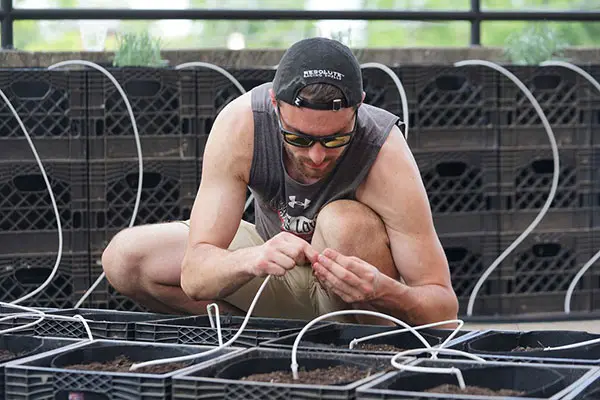 Image by Ed Brennen
Image by Ed Brennen
07/08/2021
Boston Globe
By John Laidler
The mezzanine roof at a University of Massachusetts Lowell library is now the site of a garden that will help provide fresh food to city residents in need and other community members.
Through an ongoing partnership with a local nonprofit, the university last month installed 500 growing containers for herbs, vegetables, and flowers covering the 2,300-square-foot mezzanine roof at O’Leary Library on South Campus.
The project is part of UMass Lowell’s five-year-old Urban Agriculture Program, an ongoing collaboration between its Office of Sustainability and Mill City Grows, a food justice organization that raises crops at 20 gardens in Lowell, much of which it provides free to people from under-served populations.
Ruairi O’Mahony, UMass Lowell’s director of sustainability, said just the sight of the rooftop garden — visible to students through windows in the library’s mezzanine — will benefit the campus community.
“It’s important on an urban campus to be able to show people what sustainability means in an urban setting,” he said. “So creating this garden, making efficient use of this space, is a way we can educate students about the importance of food access and food insecurity in Lowell.”
Citing other benefits, O’Mahony said the garden will offer an insulating barrier that will help keep the library cool, and will reduce rainwater runoff.
O’Mahony said UMass Lowell’s sustainability program is distinct in trying to serve both the university and the community, and the new garden builds on that by expanding the amount and variety of crops accessible to city residents while also adding new opportunities for faculty research and student learning.
The garden was installed by a team of about 12 university and Mill City Grows staff and volunteers. A grant from the state Department of Agricultural Resources covered $45,000 of the approximately $65,000 cost.
Mill City Grows will maintain the garden through an expansion of its partnership with the university. The nonprofit already maintains a smaller rooftop garden installed atop UMass Lowell’s University Crossing complex in 2019, and an 1,800-square-foot greenhouse and adjacent small farm on East Campus completed in 2017.
The new garden will grow herbs, including basil, cilantro, thyme, rosemary, and lavender, and such vegetables as corn, peppers, lettuce, flax, safflower, and sorghum. It will also grow flowers such as echinacea, nasturtium and varied wildflowers ideal for bees, which O’Mahony said is in concert with other ongoing university efforts to expand habitat for pollinators.
Most of the edible crops will go into Mill City’s existing food distribution system, which is geared to expanding access to fresh food. The group runs a mobile market and a Community Supported Agriculture program — in both of which the food is free to residents eligible for SNAP and other food benefits. It also donates food to local feeding programs and its own clients.
“Knowing that we have this partner in Lowell that is as dedicated to environmental sustainability as we are and looking for new ways … to reduce its carbon footprint and really make an impact in the community is exciting to us,” said Jessica Moore Wilson, MIll City’s executive director, referring to the university.
Among those helping to build the new garden was UMass Lowell senior Austin Thoren, a peace and justice major from Chelmsford who works in the Office of Sustainability.
“I really dove into it because I could see the difference it would make right away by the amount of crops it is going to produce,” he said, adding, “It just makes that whole roof area look so much better. I study in the library every day and what was a barren wasteland is now beautiful.”
“For me, it sets an example for what other people can do with this kind of space,” Thoren added.
